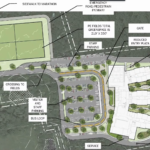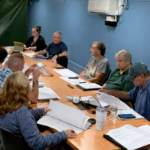The Commission on Disability at its virtual meeting Monday night heard a detailed presentation on building accessibility requirements from one of its members.
Member Mike DiMascio, a registered fire protection engineer, explained the scope of several accessibility laws and regulations as they applied to the state of Massachusetts. The Americans with Disabilities Act (ADA), the most commonly recognized federal legislation, was signed into law on July 26, 1990. The Department of Justice adopted upgrades to it in 2012. Yet, accessibility still is a challenge for people with disabilities more than three decades after the ADA’s passage.
“The ADA is actually the law that drives everything under accessibility under the federal government,” DiMascio explained. The ADA Accessibility Guidelines (ADAAG) were derived from this law to provide standards for accessibility compliance. Several other policies he described that apply to building design and accessibility standards included the Fair Housing Act and the Massachusetts Architectural Access Board (MAAB) regulations, which he said are in some aspects more stringent than the ADA.
Member Nancy “Punky” Drawe asked whether new restaurants and businesses get a copy of these guidelines, or “if they bother looking at all.” DiMascio replied that the owner would hire an architect or a consultant to advise the entity on accessibility requirements.
He pointed out that the upgraded ADAAG has more detailed construction guidelines than the original ADA. If a building was remodeled under the original ADA guidelines, it has “safe harbor” status, meaning that it does not have to be upgraded again to the more current regulations.
One interesting fact DiMascio pointed out is that no elevator is required for a building under three stories or with a footprint of less than 3,000 square feet, although there are some exceptions.
DiMascio described employment accommodations that come into play, such as providing a standup desk or a larger office with room for a wheelchair to turn. People must be allowed to enter and exit their workspaces, and common areas such as a lobby or kitchen must be accessible. An employer should work with an employee with a disability to determine adequate accommodations.
Said DiMascio: “Access to a building is only required when you have a new building or the work space is altered.”
Examples of housing accommodations are installing grab bars in bathrooms or ramps or automatic doors at building entrances. Fire alarms must be at adequate heights and have visual or sound indicators if an entire building doesn’t have sprinklers.
State and local governments must provide access to their programs. If the buildings are old, for example, an accessible room could be provided on the ground floor where residents can get help from town employees, DiMascio noted. There are a few exceptions, such as when moving a program would have a detrimental effect or a significant financial barrier.
He pointed out that state and local governments should have completed an ADA self-evaluation in 1993 and formed a corrective action plan by 1996.
“Any public building should have been corrected a long time ago,” he stressed.
New buildings must be ADA compliant. For renovations, only the renovated portion of the building needs to meet accessibility standards. DiMascio noted that many older buildings don’t have the space to become completely accessible.
“It’s also tied to the ability of the owner to make these changes,” he added.
Commission prepares for forum
The commission discussed plans for its upcoming hybrid forum on Jan. 22 at 7 p.m. at the Hopkinton Senior Center. This forum will introduce the commission to the public, speak to the results of a recent survey on resident concerns on accessibility, and allow residents to ask questions and provide feedback. The link can be accessed here.
Member Praveen Hariharan will be creating the handout, while chair Holly Morand and member Amy Ritterbusch will coordinate the supplies needed for the forum. Several town department heads have confirmed their attendance, including the police and fire chiefs along with Health Department Director Shaun McAuliffe.
Morand noted that several of the survey’s 40 respondents felt that the survey focused heavily on mobility impairments while not asking as much about neurodivergent, hearing and visual challenges. Member Nancy Cavanaugh noted that this first survey was broad in scope as an introduction, while future efforts can be more detailed. Drawe added that the forum will provide an opportunity for “face-to-face feedback.”
Drawe added that she is inviting state Rep. James Arena-DeRosa and Sen. Karen Spilka and their staff members to attend, as well as members of disability commissions in nearby communities. Morand will check to see if closed captioning would be available for those participating online as well as on a screen for the in-person audience.
The snow date for the forum is the following Monday, Jan. 29.
Commission forms connection with SEPAC
Morand announced that the Special Education Parents Advisory Council (SEPAC) has invited commission members to come to its coffee hour on Feb. 26 at 10 a.m. at the Hopkinton Public Library. SEPAC will be invited to a future COD meeting.






















0 Comments